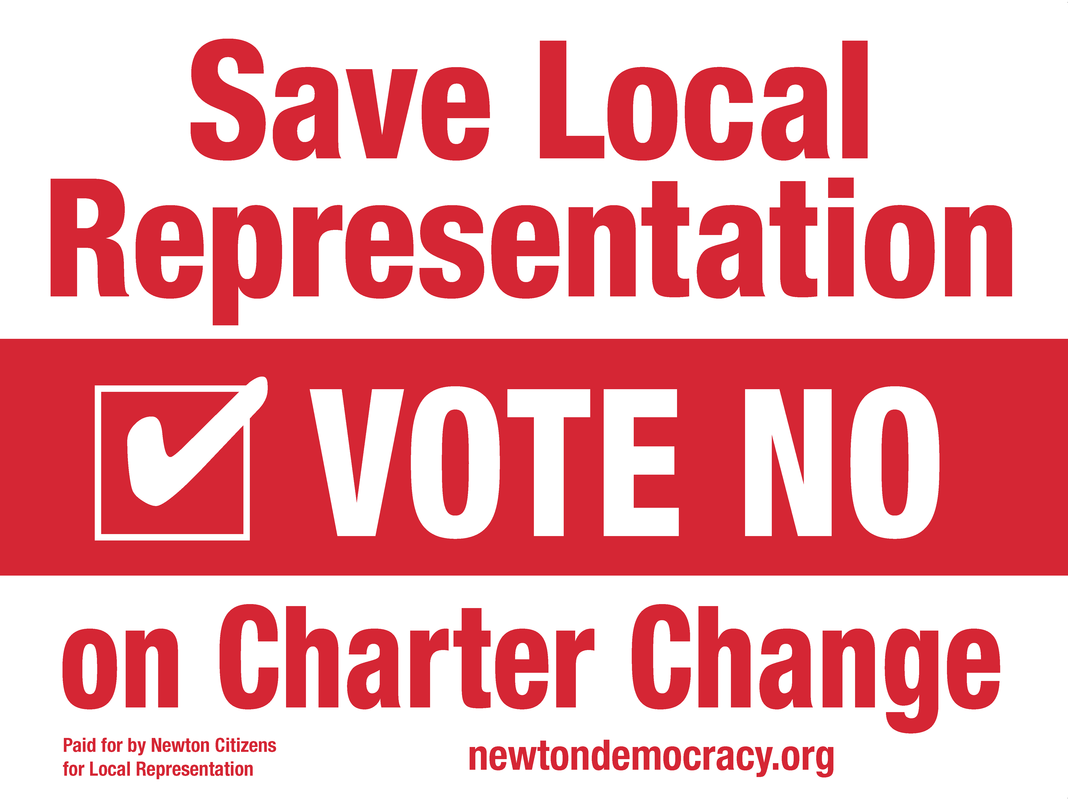|
What can the viral video of the cute three-year-old's plaintive pleas tell us about how we should vote on the Newton Charter Commission's proposal? The need to be heard, understood, reckoned with, acknowledged is a deep and early human attribute– and it is imperiled by the Charter Commission's proposal. The maneuver to eliminate the ward-only Councilor is a bold maneuver AWAY FROM the responsiveness and direct personal relationship we expect and need from those who are there to REPRESENT us.
The Newton Charter Commission took a potentially valid problem (too many councilors– either for pensions and payroll, or for consensus- and decision-management: i. e. the problem of "herding cats"), deliberated – and came up with exactly the wrong solution. Currently, TWO "at-large-" and ONE "ward-only-" -voted representatives come from each district. Rather than perform the obvious reductive surgery of halving the doubled at-large-councilors and keeping the only ward-only-, the commission did the opposite: eliminating all locally voted reps. A quick look at Newton’s history gives perspective of how this situation arose, as well as insight to its solution. Originally, Newton had a bicameral representation system, consisting of the Board of Aldermen’s body of ONE at-large member from each ward -- AND the separate Common Council’s chamber of TWO locally-voted councilors/ward. Bills had to pass each of these separate houses. In 1897, Newton's new charter merged these two houses and FLIPPED the ratio representation to its current configuration of two At-Large and one "local" Councilor from each ward. The original system could be seen as analogous to our federal and state systems of senators and representatives, with (in both cases) senators' being less locally attuned and responsive. That representatives are elected every two years and senators every six years acknowledges the people's need for closer attenuation and greater attention to their needs in a representative democracy. Senators tend to look more at the "big picture", but constituents get a closer and quicker hearing from those most responsive to their votes – their local "at-small" rather than “at-large” representative. So why did the Charter Commission eliminate the local rather than one of the two at-large councilors? Eliminating representatives with greater ties to their local area is the obvious answer. As former Aldermen Marcia Johnson wrote a year ago: "It’s not a people problem, it is a structural problem. (From) taxation to spending to land use regulation, ward-only councilors simply cannot be held accountable for their actions by people from the other seven wards… they are only accountable to one-eighth of the electorate." Oh, by the way, that "one-eighth of the electorate" -- that's YOU(!), ...when you happen not to agree with THEM. The inferred purpose, then, is to have everybody be able to be more beholden to some presumed "greater political will". Please, keep in mind, that the first change of Newton's elective representation system went in exactly the same direction, quadrupling the erstwhile city-wide- versus local- Alderman-ratio. So, in a system that was already rejiggered to subsume the local will to the general, the current change – rather than to deal with the "listen to me" voters' needs – just eliminates these most responsive local representatives. Oftentimes, our government is mistaken to be solely a democracy – when, in actuality, it is a republic. The distinction is that a pure democracy can breed a so-called "tyranny of the majority", wherein the rights and interests of some can be contravened, eliminated, and ignored by those of others whose opinions happen to align with a majority – or even worse happen to align with certain empowered interests who are able to convince merely a majority of representatives. The essence of a republic is to maintain ideas, rights and interests balanced across a wider spectrum – to act as ballast for continuity, bulwark against peremptory (and possibly attractive but often facile) "big ideas". Our system differs from a parliamentary, and is more nearly immune to citizens’ being steamrolled. The Charter Commission, in the interest of restraint and responsiveness, could have and should have eliminated the "extra" / duplicated at-large representative and maintained the locally responsible one. Their not having done so validly speaks to their motives and our need to reject their proposal. Vote “NO”. Randall Block Newtonville PS: Legislation that would “correctly” reduce the size of the Newton City Council has been filed: eliminating half the at-large councilors – leaving 8 ward, and 8 at-large. Counselor Emily Norton believes “16 is large enough to avoid group-think yet still allow for a diversity of opinion (and avoid power-centralization)’.
0 Comments
Leave a Reply. |
Mailing AddressNewton Citizens for Local Representation
PO Box 600540 Newton, MA 02460 |
|
 RSS Feed
RSS Feed
